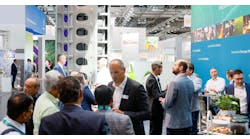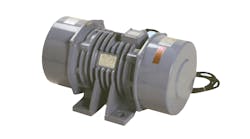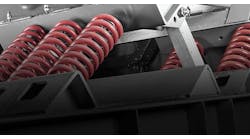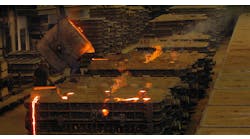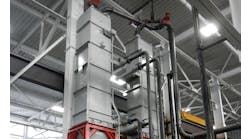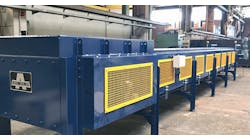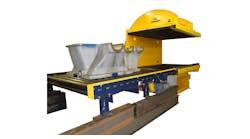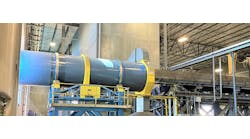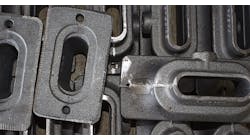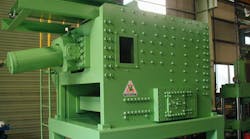Whether you run a ferrous or nonferrous casting foundry, re-melting scrap, gates and runners is a major cost. By breaking down the gangly returns, furnace charging and melting becomes more efficient. For the typical iron foundry, density of the returns are typically increased by a factor of three, so the charge crane is able to lift more material, reducing trips by a factor of five. Having the returns broken down to more optimal sizes, the instances of bridging in the melting furnaces typically are eliminated and it is common to see an extra melt cycle per shift. This is especially important for foundries with melt restrictions.
For aluminum foundries, the most efficient melters are stack melters. But, in order for these units to be as efficient as possible the charge density must be optimal. Typically, the unbroken charge is not dense enough, reducing the efficiency of the stack melter.
By loading a denser charge, the furnace cover or stack melter door is open less time, reducing the loss of temperature, further improving efficiency. And for sand casters, sand will be knocked off the returns, reducing the amount of slag in the melt – and reducing the time the cover must be open for de-slagging.
Foundries in Europe and Asia long have recognized the value of sprue and gate crushers for providing denser charge materials. The U.S. market has been reluctant to embrace this technology (in many cases reverting to the dangerous method of dropping heavy weights on the returns.) This reluctance is due mainly to old machine designs that require very high commitments of maintenance resources and time, giving crushers a bad name.
This is a thing of the past now, thanks to the “Crocodile” crusher from Yuatsuki Co. Ltd. With a machined and bolted construction, the Yuatsuki crusher is solidly built and reliable for foundry service. The tight tolerances of its machined components ensure precise movements. While the base machine is produced by Yuatsuki, Viking Technologies Inc. provides U.S.-built controls and hydraulic systems.
The crusher uses a hydraulically operated “moving plate” that squeezes the returns against a “fixed plate”. Both plates employ teeth (proprietary design) that bend (and break) ferrous materials and cut nonferrous material to optimal size. As the material breaks up, it will drop further into the “jaws” and closer to the fulcrum. This increases the force applied to the material, making it possible to crush rather large cross-sections of scrap.
One notable problem with some older crushers’ designs has been the teeth construction: They are bolted in place and have a tendency to break off after some time. The Yuatsuki crusher’s teeth plates are unitary (single piece) high-manganese castings, with the teeth formed as parts of the casting. The service life of these plates is estimated at a minimum of 15 years.
The RunnerBreaker is a very low maintenance machine. The units feature automatic lubrication systems, eliminating the need for daily maintenance. Operators simply need to remember not to let the grease reservoir run empty.
Other advantages involve safety and labor savings. Eliminating bridging in the melter means there is no need for the foundry operators to try to clear the jam manually with a long metal bar. Labor savings are realized because there is no need to move unbroken returns (mostly air), reducing the number of fork lift trips to the scrap yard by a factor of three.
Making the scrap returns denser will lower melting cost, boost melt-center productivity, reduce labor requirements, and (most important) increase safety.
Marty Putnik is sales manager for crusher sales at Viking Technologies Inc. Contact him at [email protected], or visit www.Viking-Technologies.com.
